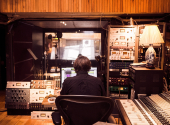
5 Places You Don’t Want Your Music to be Played
Aside from musical introverts who create music without any need to share it with anyone, most musicians inherently desire to bring their music to listeners. Whether in the form of recordings or live concerts, we want our art to resonate with people, bring them joy or touch them in some way. It is only in the interaction with the audience or the listener that a piece of music is somehow complete...
That's why we often try to get our music "out into the world" in all possible and impossible ways and rejoice whenever our song is placed in a playlist, a chart, a film or an undiscovered talent competition. Because everything counts... Doesn't it? However, let's take a look at some of the venues and situations we don't our music to be played at all.
1. Prague ham in action and now we'll have a song
I'll confess right at the start that the inspiration for this article was a purchase at a supermarket close to my home. Their playlist would, admittedly, encourage a sociological reflection on why we need background music to buy butter, socks or dog food. Because, of course, this is not about interaction or influence on the listener in the sense of musical self-expression of the songwriter. What is more important is the tempo (medium, to make shopping long and happy), the mood (positive, relaxed, not too emotionally strained) and nice lyrics to match to support the shopping.
We can all easily guess that if you want to be a commercially successful and well-known musician, then your aspiration will be to get on mainstream radio playlists. But that also puts you in the background in a lot of lucrative places like petrol stations, supermarkets, waiting rooms, hairdressers... Just anywhere that's supposed to have a "relaxed and pleasant atmosphere". For some people, this may be a sensible way to go, but for other types of musicians, this idea is hard to digest.
The use of your song in advertising is another story. I'm sure some musicians will wave it aside, we all have to make a living. Some will even see it as a success – suddenly your song will be heard by an incredible number of people. But for a certain type of musicians, this is beyond the edge, no matter how lucrative it may be.
2. Everybody listen, I'm going to play you something!
A reunion of elementary school classmates, a party in full swing, and in between your school trip smash hits, a friend who's had enough to drink remembers that he could actually play one of your songs. Preferably a metal hard stuff. Or a quiet indie-folk ballad. Something that definitely fits the ongoing 80's party... I'm pretty sure that even though you'd love to invite most of these people to your show and chat with them about your band, you're not going to be happy about this situation. Likewise if, say, in the middle of your grandfather's 70th birthday party, some gloating cousin or proud mum decides to play a recording of your punk band's concert for the whole family.
All situations like this have one thing in common. Your music is presented in a context you didn't choose, and by someone other than you. You have no control over it and there's not much you can do about it. Of course, sometimes such unexpected moments can make us happy, but more often they are a source of rather embarrassing moments.
3. People buy views
The category of unwelcome PR interactions from your friends, colleagues or family members can include their well-intentioned efforts to increase your social media reach. You invest time, money and a lot of effort to make sure you record a quality record, get the best mix possible, produce a professional video clip, release it at the best possible moment and make the whole thing look like you're serious about your music.
And while your work is slowly collecting "views" on YouTube, your colleague, who coincidentally has several thousand followers, comes to the concert and from the back row behind the column shoots a video on her phone just at the moment when the singer misses the right note, the guitarist forgets to play a solo and the drummer loses his drumstick. Thirty seconds of this quality material, backed up by her boyfriend asking if she wants a beer, then she posts it on all her profiles and lo and behold, within a few hours you have more views than you've racked up on all your songs combined in the past month. Aren't you happy about this incredible reach?
4. Hey, I've heard this
None of us wants to hear "our" musical idea on a record by another, even more famous band. We all know it... A riff, chord progression or melody comes out of nowhere while jamming, it sounds promising. This could be a great song! In the best-case scenario, you're quickly alerted in the rehearsal room by a bandmate: "Dude, exactly that riff is on the second Deep Purple's record!". You may be happy that you've come up with something as brilliant as Ritchie Blackmore, but that's about all you can comfort yourself with.
Worst-case scenario – no one in the band notices. Not even the producer, the sound engineer and the few friends you play the record for before its release. Only the YouTube control algorithm will notice. Or maybe not even that, and if you are a local band, you have a pretty good chance that you will happily play your song with the riff from the "Purples" at gigs until some nosy fan points it out.
You have a bigger problem if you're a world-class star. You can recall many disputes about "stealing" songs or musical themes in music history. For example, the song "My Sweet Lord", which George Harisson recorded on his first solo album, sparked a years-long lawsuit with The Chiffons, whose song "He's So Fine" Harisson allegedly copied. Although the court eventually called it "subconscious plagiarism", the defendant Beatle had to pay over half a million dollars.
5. And finally... no, you really don't want this
Few things can make musicians of all genres or nationalities as angry as when a politician uses their music without their consent in an election ad, or campaign or posts it on their social media. Even if it's a politician of a party that the artist in question might perhaps vote for, it's always a bit (and sometimes a lot) of thin ice. Politicians chase political points wherever they can before elections, and so it is logical to get a few extra ones when a political candidate gets a little "ride" on the wave of popularity of a well-known musician.
If the artist in question agrees and openly supports the politician, then all is well. Often though, musicians don't get involved in the political intrigue – and then their song is simply "borrowed". In the US, campaigners can even request blanket licences to play music, whose authors then have few legal options to stop them.
There is no option but to object publicly, as Neil Young did when Donald Trump decided to include his song "Rocking In The Free World" in his election playlist. Aerosmith with their "Dream On" or R.E.M. when Trump used their "It's The End Of The World As We Know It (And I Feel Fine)" in his campaign. Quite unsurprisingly, songwriters like "Born In The USA" have the most problems – Bruce Springsteen had to defend himself against the political use of the song repeatedly. For a fascinating list of songs usurped by politicians, see here.
No musician likes it when their creative work becomes a tool of someone's political marketing. If it has to be, then it is much more fun when a political speech becomes a part of the song as in the following recording.
If you have found an error or typo in the article, please let us know by e-mail info@insounder.org.





